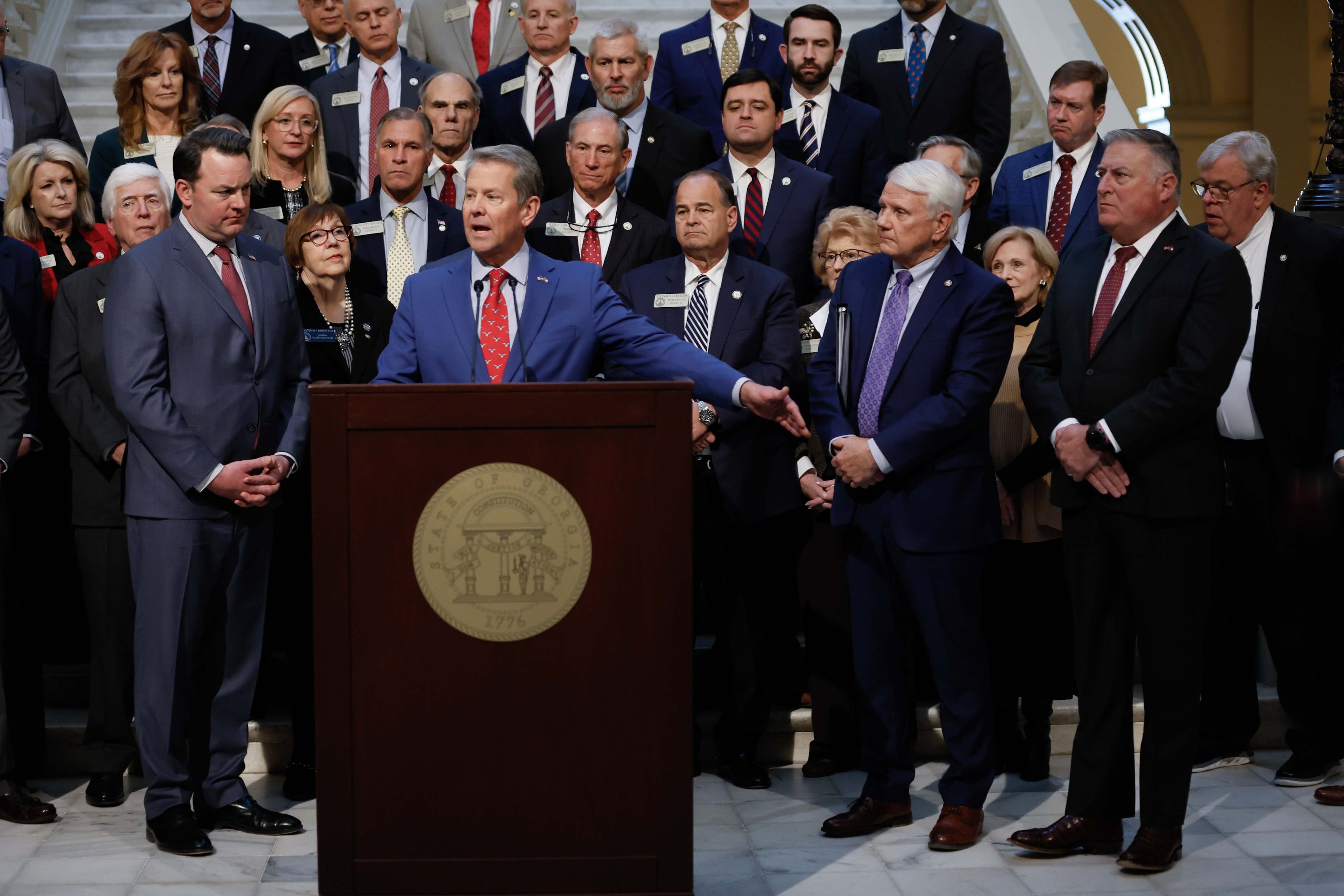Here’s how Trump’s first month brought sweeping change to Georgia
One month into his return to the White House, President Donald Trump’s shock and awe campaign has reshaped the federal government at breakneck speed with sweeping implications for Georgia.
His administration has orchestrated the firings of thousands of federal workers, pushed to eliminate entire government agencies and picked legal fights with the judicial branch that could redefine the scope of presidential powers.
He’s imposed scores of new tariffs on U.S. allies and trading partners that have far-reaching consequences for Georgia workers and consumers, while threatening to dismantle the electric vehicle incentives that have helped turn the state into a booming green energy hub.
And he’s initiated immigration crackdowns ahead of what he’s promised would be the largest mass deportation in U.S. history, while simultaneously prioritizing cultural battles to roll back transgender rights and eliminate diversity, equity and inclusion policies.
Here’s a closer look at how the changes have unfolded in Georgia.
ECONOMY AND TRADE TRADE
Within weeks of his inauguration, Trump launched a barrage of tariffs and that could upend the global trading system, force a seismic shift in domestic manufacturing and drive up consumer prices.
Trump argues the new tariffs will level out the “unfair” relationships with the nation’s trading partners, while pressuring blue-chip companies to move more production back to the U.S.
So far, Trump has either threatened or implemented tariffs against Canada, China, Mexico and the European Union — all vital trade partners with Georgia. And the fallout could be steep.

Tariffs on steel and aluminum, set to take effect next month, will ripple through Georgia’s economy. Economists expect price hikes on everything from Coca-Cola cans to construction beams, with costs mounting across industries.
Georgia’s trade exposure is growing, too. For the fourth straight year, the state set records for imports and exports, making businesses more vulnerable if Trump’s tariffs escalate into full-scale trade wars.
Not everyone sees long-term turmoil. State Sen. Russ Goodman, the Cogdell Republican who leads the Senate Agriculture Committee, said the shakeup could help struggling farmers and manufacturers competing with foreign rivals unburdened by U.S. regulations.
“I’m all for anything leveling the playing field for American agriculture and American manufacturing,” said Goodman. “If we’re not going to change the regulatory environment, then the only option we have is tariffs.”
FUNDING AND LAYOFFS
The president’s sweeping executive orders to halt trillions in federal grants and loans, fire thousands of employees and push others into retirement have triggered upheaval across the federal government.
A January order that could have frozen tens of billions of dollars in federal spending in Georgia sent public officials and nonprofit leaders scrambling to assess the fallout that could have targeted programs serving some of the most vulnerable Georgians.
Trump’s administration quickly walked back part of the order, and courts have blocked some of the cost-cutting actions. But the uncertainty remains, leaving agencies and organizations that rely on federal funds in limbo.
One of the most jarring examples came earlier this month, when Elon Musk’s new Department of Government Efficiency moved to slash $4 billion from the National Institutes of Health, including more than $100 million in Georgia research funding.
A judge swiftly blocked the funding cut, which the White House framed as an effort to limit bloated, “indirect” overhead spending on lab space, equipment and personnel.
But research institutions across the state are bracing for more disruptions and some scientific leaders have issued impassioned calls warning that groundbreaking research could be at risk.
The fallout extends beyond funding, as the wave of firings and buyouts takes a toll on Georgia’s federal workforce. Over the weekend, more than 1,000 employees at the Atlanta-based Centers for Disease Control and Prevention were fired. Others are awaiting their notices.

“I feel it’s inevitable,” said Kristen Folsom, a CDC health communications specialist who has already put her house on the market and is considering moving overseas. She and other health officials worry the cuts could cause long-term public health damage.
“I can’t just sit back and do nothing. I can’t just lay down and die. I have nothing to lose.”
Top state Republicans, meanwhile, have largely embraced the cost-cutting steps. Gov. Brian Kemp likened them to ongoing efforts in Georgia to limit the size of state government.
“I know they have some layoffs at the CDC and other things, but government can stand a little rightsizing,” he said.
IMMIGRATION AND SOCIAL ISSUES
Twice in Trump’s first month back in office, Lt. Gov. Burt Jones and House Speaker Jon Burns flew to Washington to stand beside him at high-profile White House ceremonies.
The first was for the signing of the Laken Riley Act, an immigration crackdown named for the nursing student murdered last year in Athens. The second was a celebration of Trump’s executive order that banned transgender athletes from competing in women’s school sports.
Both issues were central to Trump’s winning campaign platform. And both are key priorities this legislative session for state Republican heavyweights.

As immigration officials ramp up arrests across Georgia, lawmakers have followed with their own measures. The Georgia Senate approved a bill allowing local governments to be sued if they refuse to cooperate with federal immigration authorities. More proposals are on the way.
A state-level push to block transgender athletes from competing in women’s sports is also gaining momentum, with Republicans seeking to enshrine Trump’s order into state law.
“The executive order is only as good as the person who is holding office at that point in time,” said Jones.

Democrats have slammed the measures as political fear-mongering. They point out that there are no known cases in Georgia of transgender girls or women trying to compete on public school-sponsored female teams. And they argue that harsher immigration policies could backfire.
“While I support efforts to remove violent criminals, indiscriminately targeting hard-working immigrants who contribute to Georgia’s industries and local businesses only disrupts economic stability and tears families apart,” said Democratic state Rep. Sam Park of Lawrenceville.
HEALTH CARE
With Trump back in office, Kemp has unequivocally ruled out a full-scale Medicaid expansion and is instead pushing a narrower overhaul of his more limited program that ties coverage to work requirements.
Kemp is seeking federal approval to expand Medicaid eligibility to thousands of parents and legal guardians of young children, while scaling back other parts of the program.

The governor’s allies hope his plan could serve as a model for Republicans in Washington, who face growing pressure to slash billions from the federal budget. With Trump vowing to leave Medicare and Social Security benefits untouched, Democrats worry that Medicaid could be a prime target.
“We’re making the American workforce sicker and weaker,” said Democratic U.S. Sen. Raphael Warnock, warning that cuts could damage both the economy and national security.
ENERGY
Trump’s promise to “unleash” American energy dominance has fueled uncertainty in Georgia about the future of federally funded energy projects, from electric grid investments to efficient retrofits of government buildings.
Within hours of taking office, Trump froze federal money for a range of initiatives backed by former President Joe Biden that were central to the Democrat’s energy agenda.
Two federal judges have since ordered that money be released. But despite the court rulings, Georgia companies, local governments and nonprofits have told the AJC many of their projects remain on hold because of uncertainty.
Among the projects in limbo are at least $1 billion worth of upgrades to Georgia’s electric grid, EV charging and battery installations in Athens, and clean energy workforce training in Norcross. It’s unclear when — or if — the funds will be released.

At the same time, Trump made clear he intends to roll back emissions regulations that pushed the auto industry toward alternative fuels and urged Congress to repeal electric vehicle tax credits embedded in Biden’s Inflation Reduction Act.
Many Republicans have cheered the moves, with Kemp criticizing the Biden administration for policies that pick “winners and losers.” But some industry experts worry they could stall Georgia’s fast-growing EV sector.
“The risk is ceding more territory to global competitors who are, at times, global adversaries,” said Albert Gore of the EV industry trade group Zero Emission Transportation Association.
Staff writers Ariel Hart, Zachary Hansen and Drew Kann contributed to this report.



